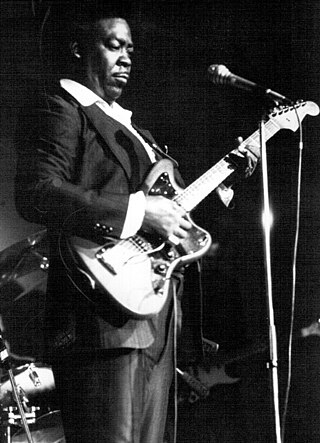Top Qs
Timeline
Chat
Perspective
Larry Davis (blues musician)
American singer and guitarist From Wikipedia, the free encyclopedia
Remove ads
Larry Davis (December 4, 1936 – April 19, 1994)[1] was an American electric Texas blues and soul blues musician. He is best known for co-writing the song "Texas Flood", later recorded to greater commercial success by Stevie Ray Vaughan.
Remove ads
Biography
Summarize
Perspective
Davis was born in Pine Bluff, Arkansas, and was raised in England, Arkansas, and Little Rock, Arkansas. He swapped playing the drums to learn to play the bass guitar. In the mid-1950s, he had a working partnership with Fenton Robinson, and following the recommendation of Bobby Bland was given a recording contract by Duke Records. Davis had three singles released, which included "Texas Flood" and "Angels in Houston".[2] Thereafter, he had limited opportunity in the recording studio. He resided in St. Louis, Missouri, for a while, and played bass in Albert King's group.[3] He also learned to play the guitar at this time; the guitar on Davis's recording of "Texas Flood" was by played by Robinson.[4]
Several single releases on the Virgo and Kent labels followed, but in 1972 a motorcycle accident temporarily paralyzed Davis's left side.[3] He returned a decade later with an album released by Rooster Blues, Funny Stuff, produced by Oliver Sain.[4] He won four W. C. Handy Awards in 1982, but a decade later he was known only to blues specialists.[4] His 1987 Pulsar LP, I Ain't Beggin' Nobody, was difficult even for blues enthusiasts to locate.[3]
In 1992, Bullseye Blues issued another album, Sooner or Later, highlighting his booming vocals and guitar playing influenced by Albert King.[2]
Remove ads
Selected discography
- Live At J.B.Hutto's (1980), P-Vine
- Funny Stuff (1982), Rooster Blues
- Angels In Houston (1982), Rounder - shared album with Bobby Bland, James "Thunderbird" Davis, Fenton Robinson
- Blues Knights (1985), Blue Phoenix; Evidence; Black & Blue - shared album with Byther Smith
- I Ain't Beggin' Nobody (1987), Pulsar; Evidence
- Sooner or Later (1992), Bullseye Blues/Rounder
- Sweet Little Angel: B.B. King Presents Larry Davis (2002), P-Vine[5]
Remove ads
See also
References
Wikiwand - on
Seamless Wikipedia browsing. On steroids.
Remove ads

